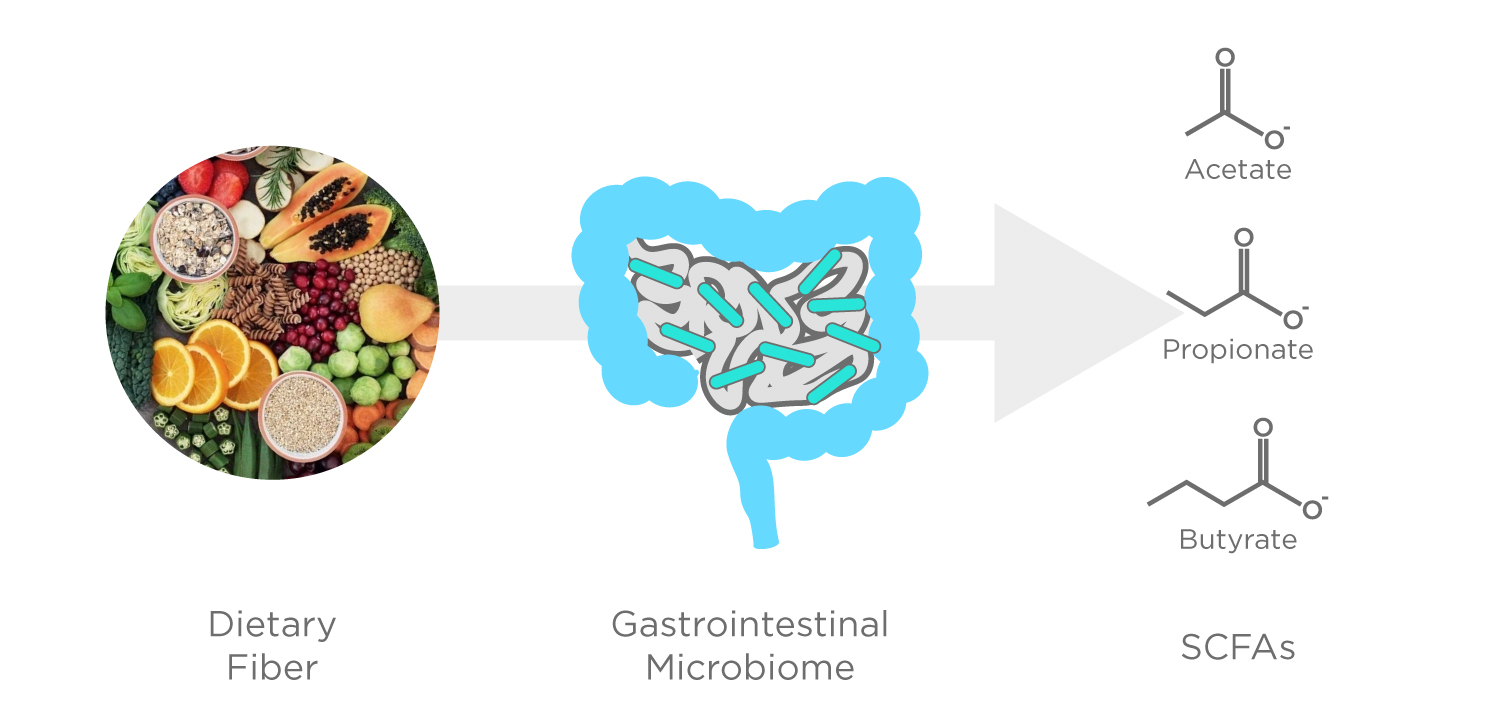Did you know that most of the fiber and carbohydrates that we eat cannot be digested by our bodies alone due to us not producing the right enzymes to do so? Instead, we rely on the gut microbiome, the trillions of microorganisms present in our gastrointestinal tract, to break down these non-digestible carbohydrates. Gut bacteria digest these carbohydrates through fermentation, which produces gases like hydrogen, methane, and a group of volatile compounds called short-chain fatty acids (SCFAs). These small molecules have a range of benefits for our gut health, having roles both in the gut and the rest of the body.
The most common SCFAs found in the gut are acetate, propionate, and butyrate, which account for 80% of all SCFAs (1). These are the salt or ester names for acetic acid, propionic acid, and butyric acid. You might recognize acetic acid, as it is the main component in vinegar! The production of SCFAs can be influenced by our diet, for example, the more fiber you eat the more SCFAs may be produced as there is simply more fiber around to be digested. However, the influence of diet on SCFA production is also thought to be due to the promotion of SCFA-producing bacteria, as some bacteria produce more SCFAs than others. Dietary fiber can act as a prebiotic to feed and increase the abundance of SCFA-producing bacteria. Studies have shown that high-fiber diets, such as the Mediterranean diet, are correlated with higher levels of SCFAs and SCFA-producing bacteria (2). The proportion of SCFAs in the gut can therefore reveal valuable information on the health of our gut microbiome.

What makes SCFAs so important for our health?
There is a lot of evidence that demonstrates the positive impact of a fiber-rich diet, and this directly impacts the concentrations of SCFAs in the body (3–6). Once produced from fermentation by bacteria in the large intestine, SCFAs are rapidly absorbed by cells in the large intestine, where they have many important functions. First of all, short-chain fatty acids (SCFAs) are estimated to provide 10% of the daily caloric requirements of humans (7,8). They also strengthen the gut barrier (9), regulate how quickly the muscles of the intestines move food through the gut, and butyrate in particular is the primary nutrient source for cells in the gut (10). This all means that SCFAs play a very important role in fueling the normal digestive process. This has a knock-on effect on our health. The immune system is strongly influenced by the gut microbiome, and SCFAs can support an anti-inflammatory state in our body. SCFAs can also regulate the metabolism of lipids, cholesterol, and glucose and cause increases or decreases in blood pressure by binding to different receptors. SCFAs are even involved in whether you feel hungry, as they can signal that no more food needs to be consumed. Due to the numerous roles of SCFAs in the maintenance of health, SCFAs are a promising target to develop as dietary supplements, probiotics, and other functional foods (11).

Given that SCFAs are produced by the gut microbiome, it is no surprise that dysbiosis, the disruption of the microbiome, can have drastic effects on SCFA levels. This in turn can disrupt the important health-promoting functions of SCFAs. In patients with inflammatory bowel disease (IBD) for incidence, populations of SCFA-producing bacteria can be significantly reduced, which impairs normal immune function (12). SCFA levels are also altered in IBS, but how they are altered is dependent on the subtype (13). In patients with IBS with constipation (IBS-C), levels of acetate, propionate, and butyrate are reduced, yet these levels are increased above normal in IBS with diarrhea (IBS-D). For more information about IBS, check out our free-to-download IBS eBook. Lower levels of butyrate and butyrate-producing bacteria have also been linked to colorectal cancer (14). Abnormal SCFA levels and irregular microbiome diversity also have wider impacts on the body beyond the digestive system, with an association between SCFA levels and dysbiosis being reported in autoimmune diseases including rheumatoid arthritis, multiple sclerosis, and type 1 diabetes (15).
SCFAs can be important indicators of gut health and disease
SCFAs are produced in the same fermentation processes that produce hydrogen and methane gases. These gases can act as reliable biomarkers to provide information on gut health and gastrointestinal conditions due to being produced by the gut microbiome. These gases can be detected in exhaled breath as they are absorbed into the blood, allowing them to travel from the gut to the lungs. When levels of these gases are correlated with gastrointestinal symptoms, for example by using our OMED Heath Breath Analyzer and companion app, we can gain a greater understanding of the causes and triggers of unpleasant symptoms in conditions such as IBS, small intestinal bacterial overgrowth (SIBO), and food intolerances. This can work in conjunction with gut health symptoms tracked in the app to help experts gain an understanding of potential triggers of bad gut health to develop a personalized plan to help.
SCFAs can also provide insight into the status and health of our gut and the gut microbiome. Measuring the levels of SCFAs in the body could provide further insight into gut microbiome composition and the bacteria colonizing the gut. As well as general information on gut health, the impact of dysregulated SCFA levels in disease gives these molecules the potential to act as specific biomarkers for disease. All of these factors combined make SCFAs attractive potential gut health biomarkers. But how can we measure SCFAs to exploit their benefits as gut health indicators? Like hydrogen and methane gases, SCFAs can also be detected in exhaled breath using breath analysis techniques. Our partner company, Owlstone Medical, conducts and supports important research into the identification of new breath biomarkers for clinical use.
About OMED Health
At OMED Health, we aim to help people take control of their gut health with easy-to-use home breath testing. Through the discovery of novel biomarkers and the subsequent development of these breath-testing devices, we can also conduct further research to help understand gut health and its impact on environmental factors. We have developed the OMED Health Breath Analyzer and App, an at-home breath-testing device that enables the monitoring of key gut microbiome-associated gases in the breath alongside tracking lifestyle factors such as your diet in the app. Our app also features a food diary where you can record your intake of food and any symptoms you are experiencing. This means you can see the effects of things such as a low-FODMAP diet and prebiotics on your gut health.
References
- Nogal A, Valdes AM, Menni C. The role of short-chain fatty acids in the interplay between gut microbiota and diet in cardio-metabolic health. Gut Microbes. 13(1):1897212. doi: 10.1080/19490976.2021.1897212
- Zhao L, Zhang F, Ding X, Wu G, Lam YY, Wang X, et al. Gut bacteria selectively promoted by dietary fibers alleviate type 2 diabetes. Science. 2018 Mar 9;359(6380):1151–6. doi: 10.1126/science.aao5774
- Vetrani C, Costabile G, Luongo D, Naviglio D, Rivellese AA, Riccardi G, et al. Effects of whole-grain cereal foods on plasma short chain fatty acid concentrations in individuals with the metabolic syndrome. Nutr Burbank Los Angel Cty Calif. 2016 Feb;32(2):217–21. doi: 10.1016/j.nut.2015.08.006
- van der Beek CM, Canfora EE, Kip AM, Gorissen SHM, Olde Damink SWM, van Eijk HM, et al. The prebiotic inulin improves substrate metabolism and promotes short-chain fatty acid production in overweight to obese men. Metabolism. 2018 Oct;87:25–35. doi: 10.1016/j.metabol.2018.06.009
- Velikonja A, Lipoglavšek L, Zorec M, Orel R, Avguštin G. Alterations in gut microbiota composition and metabolic parameters after dietary intervention with barley beta glucans in patients with high risk for metabolic syndrome development. Anaerobe. 2019 Feb;55:67–77. doi: 10.1016/j.anaerobe.2018.11.002
- Hald S, Schioldan AG, Moore ME, Dige A, Lærke HN, Agnholt J, et al. Effects of Arabinoxylan and Resistant Starch on Intestinal Microbiota and Short-Chain Fatty Acids in Subjects with Metabolic Syndrome: A Randomised Crossover Study. PloS One. 2016;11(7):e0159223. doi: 10.1371/journal.pone.0159223
- den Besten G, van Eunen K, Groen AK, Venema K, Reijngoud DJ, Bakker BM. The role of short-chain fatty acids in the interplay between diet, gut microbiota, and host energy metabolism. J Lipid Res. 2013 Sep;54(9):2325–40. doi: 10.1194/jlr.R036012
- Bergman EN. Energy contributions of volatile fatty acids from the gastrointestinal tract in various species. Physiol Rev. 1990 Apr;70(2):567–90. doi: 10.1152/physrev.1990.70.2.567
- Overby HB, Ferguson JF. Gut microbiota-derived short chain fatty acids facilitate microbiota:host crosstalk and modulate obesity and hypertension. Curr Hypertens Rep. 2021 Feb 3;23(2):8. doi: 10.1007/s11906-020-01125-2
- Roediger WEW, Duncan A, Kapaniris O, Millard S. Reducing sulfur compounds of the colon impair colonocyte nutrition: Implications for ulcerative colitis. Gastroenterology. 1993 Mar 1;104(3):802–9. doi: 10.1016/0016-5085(93)91016-B
- Roy CC, Kien CL, Bouthillier L, Levy E. Short-chain fatty acids: ready for prime time? Nutr Clin Pract Off Publ Am Soc Parenter Enter Nutr. 2006 Aug;21(4):351–66. doi: 10.1177/0115426506021004351
- Zhang D, Jian YP, Zhang YN, Li Y, Gu LT, Sun HH, et al. Short-chain fatty acids in diseases. Cell Commun Signal. 2023 Aug 18;21(1):212. doi: 10.1186/s12964-023-01219-9
- Jiang W, Wu J, Zhu S, Xin L, Yu C, Shen Z. The Role of Short Chain Fatty Acids in Irritable Bowel Syndrome. J Neurogastroenterol Motil. 2022 Oct 30;28(4):540–8. doi: 10.5056/jnm22093
- Mirzaei R, Afaghi A, Babakhani S, Sohrabi MR, Hosseini-Fard SR, Babolhavaeji K, et al. Role of microbiota-derived short-chain fatty acids in cancer development and prevention. Biomed Pharmacother. 2021 Jul 1;139:111619. doi: 10.1016/j.biopha.2021.111619
- Kim CH. Complex regulatory effects of gut microbial short-chain fatty acids on immune tolerance and autoimmunity. Cell Mol Immunol. 2023 Apr;20(4):341–50. doi: 10.1038/s41423-023-00987-1



